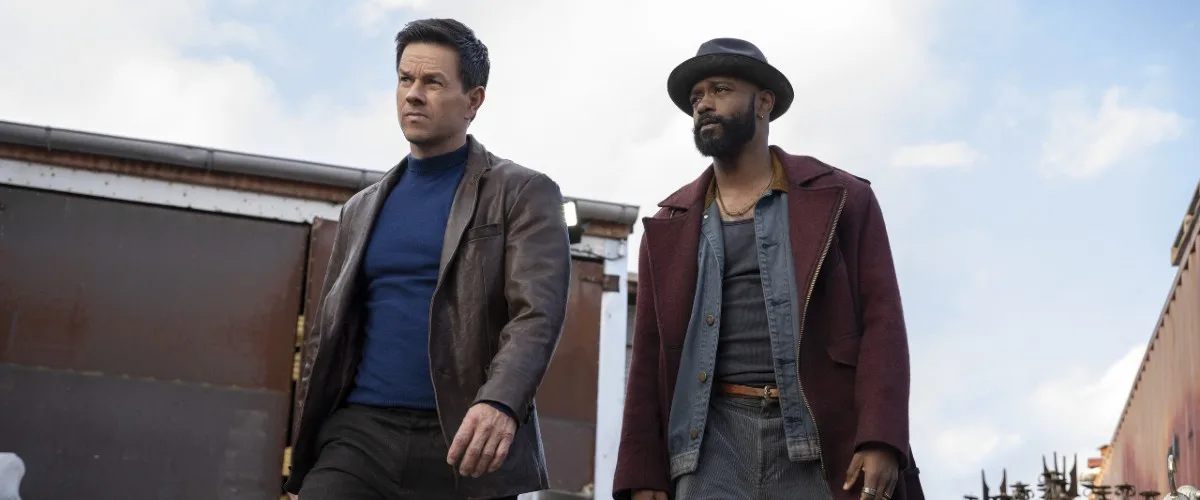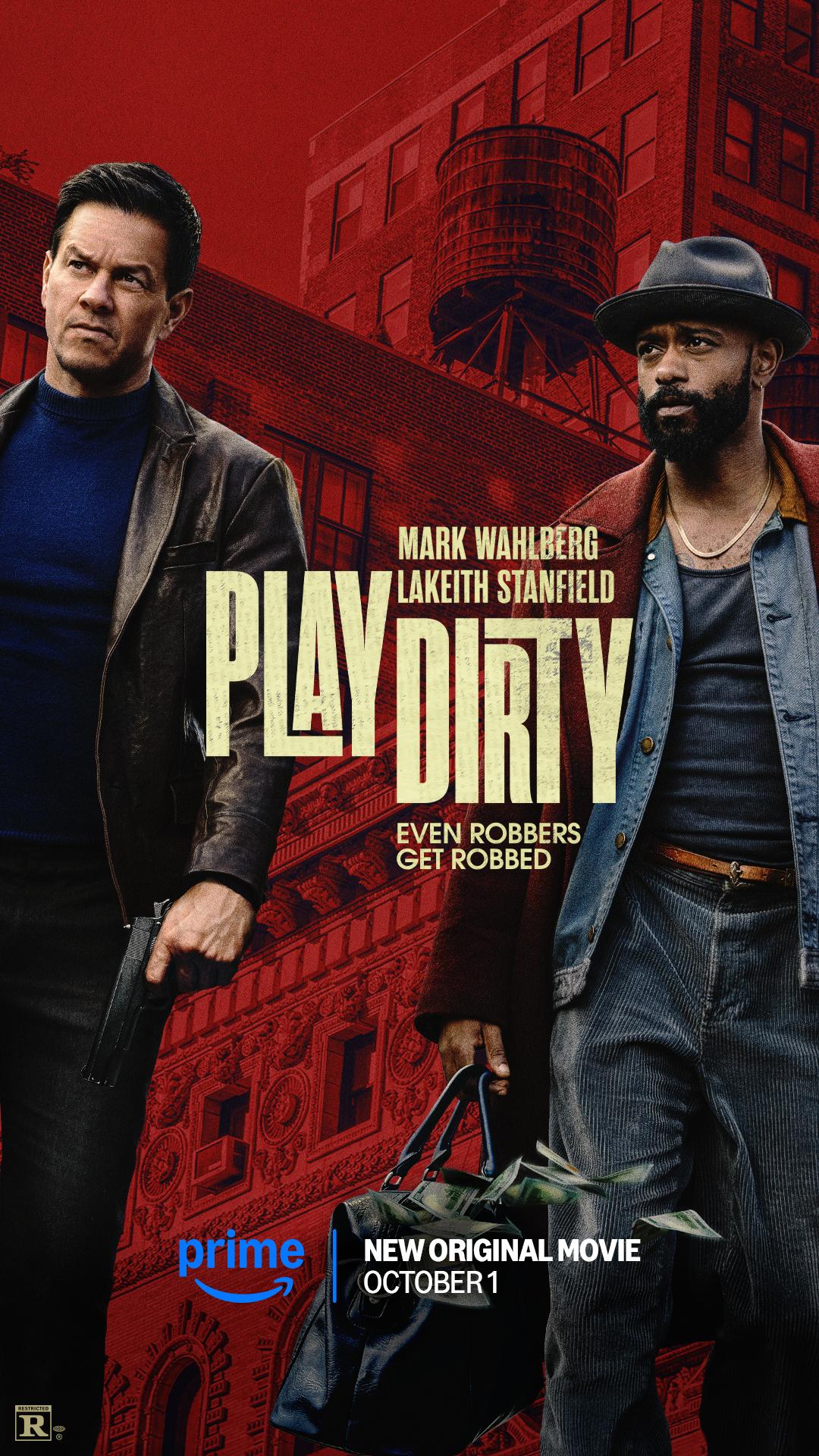Although it has a solid cast, some amusing bits, and lots of imaginative violence, “Play Dirty,” a comedy-thriller-action movie about the theft of already-stolen treasures in a plot to topple a dictator, is easily the most forgettable of Shane Black‘s films, as both writer and writer-director. This is not good news considering that Black’s filmography includes the original “Lethal Weapon,” “The Long Kiss Goodnight,” “Kiss Kiss Bang Bang,” “The Nice Guys,” and other classics of smart-goofy, quip-heavy, proudly R-rated action cinema. (Also “The Predator.”) That’s not the world’s worst news, since Black’s work is more consistently fun-focused than that of almost any major American filmmaker besides Steven Soderbergh; the worst thing Black could make would still be a decent way to spend two hours. Nevertheless, it’s difficult to sit through “Play Dirty” without thinking about its failures.
Number one is the movie’s star, Mark Wahlberg, who plays Parker. Lee Marvin he ain’t. He’s been a leading man for about thirty years, but what does he bring to a project, really? His name still doesn’t promise anything except “this is a movie, and Mark Wahlberg happens to be in it.” He’s not particularly funny, nor is he of much use in love stories (unless he’s cast opposite an actress who has enough passion for two people, like Amy Adams in “The Fighter”). And although he handles himself well in action sequences and is pretty good with a threat, his range is so narrow that he makes Clint Eastwood seem like Daniel Day-Lewis in comparison. He’s not believable or especially interesting unless he’s cast as a working-class guy with a good heart but not much common sense (“Boogie Nights,” “The Fighter,” “The Yards”) or a slimeball (“The Departed,” the role that won him an Oscar nomination as Best Supporting Actor).
As Parker, he’s always the least compelling actor in any given scene—a remarkable achievement when the only other performers are extras. Enigmatic, fearsome characters don’t work onscreen unless the actor playing the character has magnetism, even when they’re sitting still and not saying a word. Again, not Wahlberg. There are shots of him in this movie where we’re supposed to see the wheels turning in Parker’s reptilian brain, but all you get is a look that’s stranded somewhere between peevishness and distraction.
The plot is silly, piling deception upon deception, and offering up spectacular moments of bloodshed and pyrotechnic mayhem that would lead the news, but they are treated with more of a shrug here. But that’s OK—lots of movies do that. The problem here is that nothing seems to matter to the plot or any individual character. The film kicks off with Parker leading a robbery that seems constantly on the verge of going off the rails, then finally does. Since there are lots of surprises in it, suffice to say the ultimate injury against Parker is a betrayal, which is what drives the plots of most Parker books. He’s constantly being double-crossed and left for dead, only to recover and kill the people who mistakenly thought they’d killed him. That happens again here, courtesy of a fellow criminal named Zen (Rosa Salazar), a black ops-type turned robber whose viciousness is actually in service of a complex plan to topple the dictator who’s been ruling her home country for years.
This movie is described as being “adapted from” the Parker books by Black and co-writers Charles Mondry and Anthony Bagarozzi, but it’s more accurate to say they inspire it. It feels like a work of high-profile fan fiction, not unlike the TV series “Hannibal” or the Jack Reacher series on Amazon (which also funded and distributed “Play Dirty” under the MGM banner, which Jeff Bezos now owns). Elements and characters from the texts are liberally sprinkled throughout, and there are some meta-textual in-jokes, such as the corporate office with a sign out front that reads “Westlake Group.”
Fittingly, that company is a front for The Outfit, the shadowy organized crime cabal that tormented Parker in the novel The Hunter, adapted as both “Point Blank” and “Payback.” The chief, Lozini (Tony Shalhoub), initially seems like a legitimate businessman who’s tied into the underworld, but of course, he’s more than that, and has an army of anonymous assassins that he can dispatch to deal with those who’ve displeased him. The story has layers upon layers, all of them feeling like disquieting attempts to pull the rug out from under the audience every ten minutes. It happens so often that it becomes tedious, and it doesn’t help that the characters don’t seem all that invested in anything that’s happening. Even the killing of several of Parker’s associates doesn’t seem to make much impression on Parker, either as a strike against him emotionally or an insult to him professionally.
The opening heist is a setup for a much bigger heist, which leads to the biggest heist of all: the aforementioned art treasures are being brought to the United Nations for display, but only so they can be taken by the dictator himself, who intends to sell out the country that he claims is so important to him, and leave his people even more destitute than they already are. A group of rebels wants to steal the dictator’s treasures to fund the coup. Other parties also want the treasure, including Parker, whose end might amount to $300 million, minus bribes and other incidentals.
Black’s ability to sketch vivid characters who appear in only a scene or two, and often exit without a pulse, remains unmatched. There are bit players in “Play Dirty” who have more personality than the guy who’s supposed to be anchoring the story. Nick Russell and Saskia Archer shine in the opening heist as, respectively, a bank manager who worries that his capitulation to the robbers makes him look weak in the eyes of his fiancée, and the fiancée, who couldn’t care less about such matters. Adam Dunn has a blast playing Reggie Riley, an obnoxious Jersey City, New Jersey crook with a diamond ear stud, fancy eyeglasses, and an all-white ensemble (including a cowl-necked turtleneck). He struts into the story with a girl on each arm who obviously isn’t with him for his looks, and speaks so disrespectfully to Parker that you know he’s not long for this world. Gretchen Mol does a lot with a little role as the wife of one of Parker’s slain associates; she manages to draw something recognizably human out of Wahlberg, and briefly makes an otherwise reflexively glib movie feel as if it cares about people beyond their plot utility.
The film’s moral compass spins around and around but never settles anywhere. Parker commits a couple of killings in this movie that would code him as a bad guy if he had a different name. At one point, he gives a woman whose husband has just been shot dead a small portion of the proceeds from a heist as compensation for her and her child’s shock, mere moments after the killing, which happens right in front of them. Others lightly mock this for its callousness, and rightfully so. Still, it’s impossible to tell from Wahlberg’s performance and Black’s direction if we’re supposed to see it as a bleakly comedic comment on what passes for honor among thieves, an indication of Parker’s psychopathy, or just a mean but weightless joke, like the kills in an old Arnold Schwarzenegger movie.
Wahlberg is surrounded by supporting players who act him off the screen even when his character is performing feats of strength and agility. First among equals is LaKeith Stanfield as Grofield, a character imported from Westlake’s work—a thief who uses his ill-gotten gains to fund an experimental theater in a Midwest barn. When Grofield’s accountant asks how a theater company that’s posted losses for five years can remain open, Stansfield’s sly expression suggests that Grofield is not a thief pretending to be an artist but an artist pretending to be a thief (although a subsequent comment about plays being performed without an audience muddies that reading). There are other compensations as well, including a noir-inflected score by Alan Silvestri (“Forrest Gump,” “Back to the Future”), one of the last of the old-school motion picture soundtrack composers. He gives the movie a bit of the soul that it otherwise lacks.
But the entire thing looks and plays rather cheap for such a clearly expensive production. The supposedly New York-New Jersey settings look green-screened and CGI’d, and the quality of the compositing ranges from decent to poor. (The movie’s credits indicate that it was shot entirely in Australia, i.e., on soundstages.) In one action sequence, Parker scrambles around on a racetrack trying not to get run over by horses that have never seen the outside of a computer’s hard drive. Wrecked cars fly through the air weightlessly. A sequence involving an elevated train is so cartoonishly janky that it would’ve had “The French Connection” director William Friedkin yelling obscenities at his TV.
This would typically be the place in an action movie review where the writer would compliment the leading man for holding everything together, despite the challenges surrounding him. Unfortunately, Wahlberg does not so much lead the film as merely exist within its fictional space, outshone at every turn by the actors around him, including walk-on players with a couple of lines. Parker and Grofield’s relationship is so well-written that their scenes together ought to be consistently bright spots. Instead, they’re the actors’ version of the game of catch, where one of the participants stares blankly at the thrower as the ball sails over his shoulder. In the end, it’s the audience that gets robbed.




















